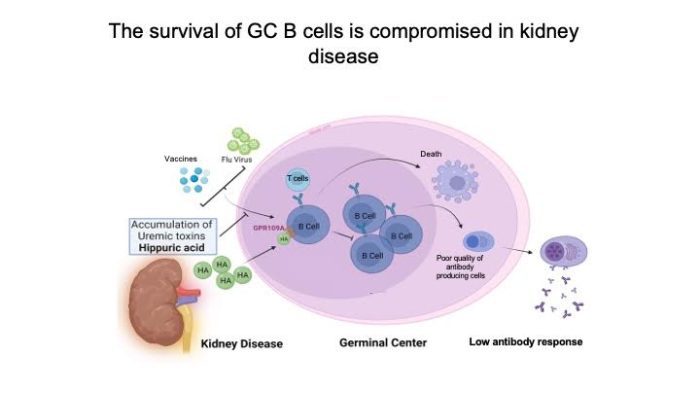Regular screening for CKD can help identify early stage kidney disease
By David Dunaief, M.D.

In last week’s article about chronic kidney disease (CKD), we learned that roughly 90 percent of U.S. adults who have CKD are not even aware they have it (1). How can this be?
CKD can be asymptomatic in its early stages. Once it reaches moderate stages, vague symptoms like fatigue, malaise and loss of appetite typically surface. When CKD reaches advanced stages, symptoms become more obvious and troublesome.
Your kidneys are basically blood filters. They remove waste, toxins, and excess fluid from your body. They also play roles in controlling your blood pressure, producing red blood cells, maintaining bone health, and regulating natural chemicals in your blood.
When your kidneys aren’t operating at full capacity, you can experience heart disease, stroke, anemia, infection, and depression – among others.
When should you be screened for CKD?
Those at highest risk for CKD include patients with diabetes, high blood pressure and those with first-degree relatives who have advanced disease.
If you have diabetes, you should have your kidney function checked annually (2). If you have other risk factors, like high blood pressure, heart disease, or a family history of kidney failure, talk to your physician about establishing a regular screening schedule.
A 2023 study by Stanford School of Medicine recommends screening all U.S. adults over age 35. The authors conclude that the costs for screening and early treatment are lower than the long-term cost of treatment for those who are undiagnosed until they have advanced CKD (3). They also project that early screening and treatment will improve life expectancy.
How can you protect your kidneys?
Walking regularly and reducing protein and sodium consumption can help. One study shows that walking reduces the risk of death by 33 percent and the need for dialysis by 21 percent (4). Those who walked more often saw better results: participants who walked one or two times a week had a 17 percent reduction in death and a 19 percent reduction in kidney replacement therapy, while those who walked at least seven times per week experienced a 59 percent reduction in death and a 44 percent reduction in the risk of dialysis. The study included 6,363 participants with an average age of 70 who were followed for an average of 1.3 years.
With CKD, more dietary protein may be harmful. In a meta-analysis of 17 studies of non-diabetic CKD patients who were not on dialysis, results showed that the risk of progression to end-stage kidney disease, including the need for dialysis or a kidney transplant, was reduced 36 percent in those who consumed a very low-protein diet, rather than a low-protein or a normal protein diet (5).
How much sodium is too much? Results of one study showed that modest sodium reduction in our diet may be sufficient to help prevent proteinuria (protein in the urine) (6). Here, less than 2000 mg per day was shown to be beneficial.
What role do high blood pressure medications play?
Certain medications, ACE inhibitors or ARBs, are regularly prescribed to patients who have diabetes to protect their kidneys. ACEs and ARBs are two classes of high blood pressure medications that work on the kidney systems responsible for blood pressure and water balance (7).
What about patients who do not have diabetes? Study results show that these medications reduced the risk of death significantly in patients with moderate CKD. Most of the patients were considered hypertensive. However, there was a high discontinuation rate among those taking the medications. If you exclude discontinuations, the results are robust with a 63 percent reduction in mortality risk.
What about NSAIDs?
Non-steroidal anti-inflammatory drugs (NSAIDs), which include ibuprofen and naproxen, have been associated with CKD progression and with kidney injury in those without CKD (1). NSAIDs can also interfere with the effectiveness of ACE inhibitors or ARBs. Talk to your doctor about your prescription NSAIDs and any other over-the-counter medications and supplements you are taking.
What should I focus on?
It’s critical to protect your kidneys. Fortunately, basic lifestyle modifications can help; lowering sodium modestly, lowering your protein consumption, and walking frequently may all be viable options. Talk to your physician about your medications and supplements and about whether you need regular screening.
References:
(1) cdc.gov. (2) niddk.nih.gov (3) Annals of Int Med. 2023;176(6):online. (4) Clin J Am Soc Nephrol. 2014;9(7):1183-9. (5) Cochrane Database Syst Rev. 2020;(10):CD001892. (6) Curr Opin Nephrol Hypertens. 2014;23(6):533-540. (7) J Am Coll Cardiol. 2014;63(7):650-658.
Dr. David Dunaief is a speaker, author and local lifestyle medicine physician focusing on the integration of medicine, nutrition, fitness and stress management. For further information, visit www.medicalcompassmd.com or consult your personal physician.












